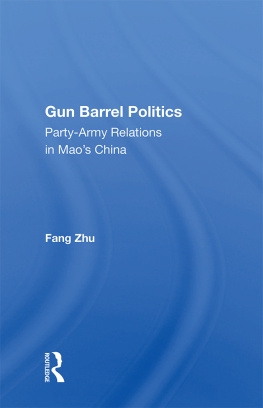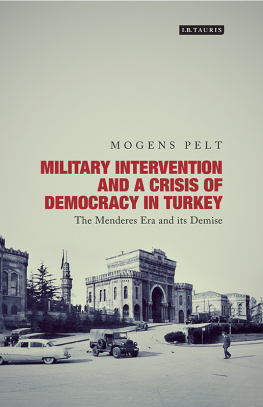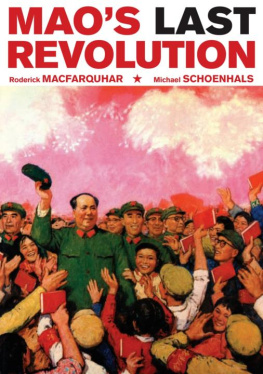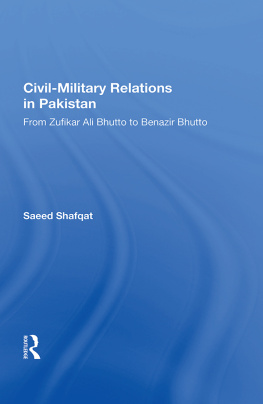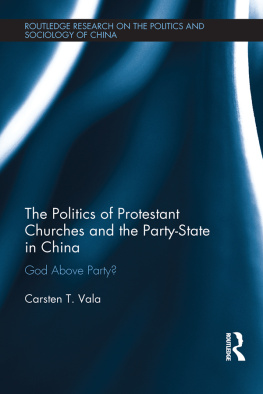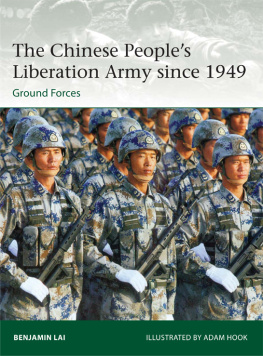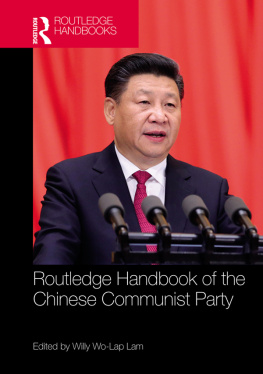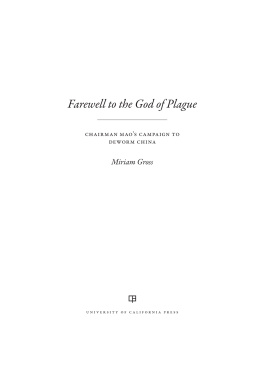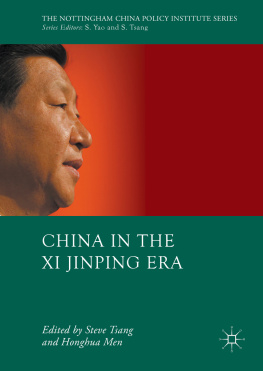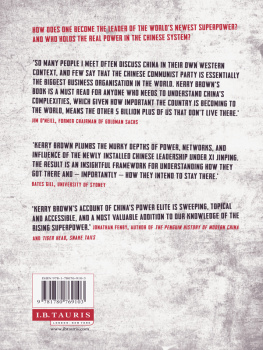Gun Barrel Politics
Gun Barrel Politics
Party-Army Relations in Maos China
Fang Zhu
First published 1998 by Westview Press, Inc.
Published 2018 by Routledge
52 Vanderbilt Avenue, New York, NY 10017
2 Park Square, Milton Park, Abingdon, Oxon OX14 4RN
Routledge is an imprint of the Taylor & Francis Group, an informa business
Copyright 1998 Taylor & Francis
All rights reserved. No part of this book may be reprinted or reproduced or utilised in any form or by any electronic, mechanical, or other means, now known or hereafter invented, including photocopying and recording, or in any information storage or retrieval system, without permission in writing from the publishers.
Notice:
Product or corporate names may be trademarks or registered trademarks, and are used only for identification and explanation without intent to infringe.
Library of Congress Cataloging-in-Publication Data
Chu, Fang.
Gun barrel politics: party-army relations in Maos China / Fang
Zhu.
p. cm.
Includes bibliographical references and index.
ISBN 0-8133-3456-X (hardcover)
1. Civil-military relationsChina. 2. ChinaPolitics and
government19491976. I. Title.
JQ1506.C58C58 1998
322.50951dc21 98-9518
CIP
ISBN 13: 978-0-367-01046-1 (hbk)
This book would not have been possible without guidance, assistance, and encouragement from professors Andrew Nathan and Thomas Bernstein. They read every draft of my preliminary manuscript and provided extensive comments and criticisms. Their high academic standards and personal integrity have been an inspiration to me since I started studying at Columbia University. I owe especially a personal and intellectual debt to Andrew Na than, who has helped me in every stage of my professional career, including the publication of this book. I am heavily indebted to Howard Wriggins and his wife, Sally Wriggins, whose support and reassurance have for years been my major source of strength to continuously pursue intellectual growth. Howard Wriggins read key parts of my manuscript and gave invaluable comments and advice.
In addition, Carol Lee Hamrin gave professional advice and moral support to my research. John Watt lent long-time support and help in many ways. Paul Godwin provided detailed criticisms on both the theory arid historical facts. Samuel Kim made useful comments and suggestions. David Shambaugh gave strong encouragement and valuable assistance toward eventual publication of this study. My Chinese friends, Yuan Zhiming, Xie Xuanjun, Zhu Baoxian, and Zhang Xiaojun, helped clarify my thoughts through long discussions of key issues. I am grateful to all of them.
My thanks also go to my highly professional editors at Westview Press, Laura Parsons, Carol Jones, and Elizabeth Lawrence. My copy editor, Rebecca Ritke, greatly improved the original manuscript.
The American Council of Learned Society provided a crucial grant that made it possible for me to do research in Hong Kong and Beijing. Stanley Heginbotham encouraged me to apply for the ACLS grant and Thomas Bernstein and Richard Wilson helped me secure a Hong Kong visa. My hosts at the University Service Center in Hong Kong, especially Ms. Jean Hung, provided expert assistance.
Colleagues at Oklahoma State University William Parle, James Davis, David Nixon, Robert England, and Michael Hirlinger all gave helpful advice and moral support for my research and publication.
Finally, I must acknowledge the help from my parents, Zhu Lie and Fang Zhaomei, my sister, Zhu Ming, and her husband, Fu Xu, for their unfailing love and confidence in me.
Though these acknowledgments cannot do justice to the abundant assistance I have received from all these individuals and organizations, none of them should be held accountable for any factual or conceptual statements and interpretations, which are solely my responsibility.
Fang Zhu
1
Introduction
China's party-army relations since 1949 have presented a continuous paradox. On one hand, the military leaders were deeply involved in intra-party conflicts, colluding or cooperating with their civilian colleagues for political power and policy influence. On the other hand, even at the peak of its political power, the People's Liberation Army (PLA) was never able to overthrow the party leadership. Instead, it displayed remarkable discipline and loyalty to the party regime. Two fundamental questions thus arise: What caused the PLA to become so involved in party politics, and what prevented it from taking over?
The PLA's involvement in politics has been evident in every key political crisis since the founding of the People's Republic of China (PRC). The first such crisis came in 1953, during a major power redistribution in the leadership, which ended with the purge of the "Gao-Rao Antiparty Clique." Gao and Rao were senior political-military leaders with substantial power in their respective military and administrative regions. Soon after they were transferred to the central leadership in Beijing, they were accused of trying to usurp power on the top level. We now know that they did not act alone. Among their chief supporters were some of the highest-ranking commanders of the communist army. It was remarkable that the party center was able to purge Gao and Rao without causing any significant disturbances in the military ranks. This was the first case of intraparty conflict that ended with a majority of the military elite yielding to the central party authority.
The next major leadership conflict occurred in 1959. At a series of Politburo meetings known as the Lushan Conference, Defense Minister Peng Dehuai took the lead in criticizing Mao's economic policies known under the rubric of the Great Leap Forward. Initially, a majority of the party elite shared Peng's views. Yet when the party center headed by Mao Zedong, Liu Shaoqi, and Zhou Enlai decided to suppress the critics, the opposition collapsed. Peng was subsequently dismissed, together with his chief of general staff and other military and civilian associates. Again the central authority of the party had prevailed. However, the seeds of division were deeply planted, and the Peng case later would reemerge, triggering the biggest political turmoil in the PRC's history, during the Cultural Revolution.
The PLA played a leading role throughout the Cultural Revolution. With military support led by Lin Biao, Mao was able to overrule the majority of the party leadership in 1966, turning the nation drastically to the left. Yet when the Maoist Red Guards tried to seize power from party and government organizations in 1967, a majority of the local PLA collaborated with their civilian colleagues to suppress the young rebels in spite of Mao's personal blessings to their revolutionary radicalism. This powerful resistance forced Mao to back off from his original plan to reshuffle the entire ruling echelon. Although the PLA acquired substantial political power in both the center and the provinces in the wake of the power seizure campaign, it did not directly challenge the political sovereignty of the party. After the fall of Lin Biao, the military gradually was eased out of party and state apparatuses. This was another example of the party's ultimate control.
The PLA's power and influence had risen with the political star of Lin Biao, reaching its peak at the Ninth Party Congress in 1969. In spite of his enormous stature in the armed forces and the party, however, Lin never attained the party's chairmanship. His alleged coup never materialized. The power struggle between Mao and Lin ended with Lin's death when his military jet crashed under suspicious circumstances in Mongolia, in late 1971. His followers were subsequently purged, and the PLA was reorganized to root out Lin's influence.


